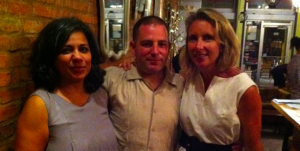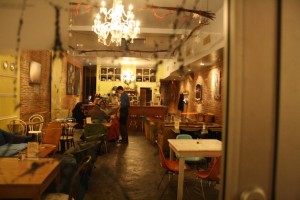(Banner photo © Joanne S. Lawton/Washington Business Journal)
Kera Carpenter is not the type of person who enjoys being billed a hero. The successful restaurateur, who owns Domku in Washington DC would much rather stay well below the radar and had to scramble to come up with a photo of herself. Carpenter much prefers a behind-the-scenes role, whether it’s creating new menus or thinking up ways to maintain Domku’s spectacularly tiny waste stream.  Nevertheless, an ambitious initiative to provide incubation and mentoring for emerging food professionals is swiftly lifting Carpenter into the spotlight.
Nevertheless, an ambitious initiative to provide incubation and mentoring for emerging food professionals is swiftly lifting Carpenter into the spotlight.
Carpenter launched NURISH: The Center for a Creative Culinary Economy last year after noting with frustration the utter lack of support that existed for startup food businesses. She is in the midst of her organization’s first big event, StartUp Kitchen, which literally offers Domku as the space for the winning business to test its concept. Three finalists were selected in June, including Worthwhile Provisions & Meats, a butcher/bistronomique concept; Chaya, a “restaurant with a purpose” showcasing mostly plant-based foods; and DC Dosa, a takeout enterprise featuring East Indian dosas (rice and lentil pancakes) with three fillings and three chutneys made to order.

Three food entrepreneurs pitched their business idea to a panel of judges during the first StartUp Kitchen competition. Winner Priya Ammu (at left, with other finalists Julien Shapiro and Bettina Stern) gets to test her concept for six weeks at Domku, Kera Carpenter's restaurant in Washington DC.
Two weeks ago, the winner, DC Dosa pitched by Priya Ammu, was selected by a panel of local judges. Domku held a launch party to introduce the winner last week and in September, the incubation begins.
More of Carpenter’s thoughts on how the food community could–and should–mentor its own are next.
TOQUE: It is odd that while so many TV shows offer big breaks to chefs and restaurateurs there is not a broadbased support network in real life. What illustrated this gap to you?
CARPENTER: I was frustrated by conventional avenues, like the SBA and local business development groups because I don’t think these folks are geared to think about food business other than conventional grocery stores. Even the restaurant association doesn’t really understand how to support new restaurateurs. Bankers and business consultants love to talk about how hard the restaurant business is and how it has such a high failure rate, yet they do nothing to help.
We see with our own eyes in every community that good local restaurants have the power to transform neighborhoods into vital communities, but government agencies, banks and development groups somehow refuse to acknowledge this obvious fact.
TOQUE: What was the hardest thing about launching StartUp Kitchen? How did you get the word out?
CARPENTER: Luckily, I had the foresight to realize I needed a good marketing partner who was really focused on developing the local restaurant scene. Partnering with Think Local First was the smartest thing I could have done. Because of that partnership, the launch has been easy. They have the network in place, the contacts and the press. They also have the ability to organize events in a short time frame.
TOQUE: Who were some surprising supporters? (individuals or businesses) What has been the reaction around your neighborhood?
CARPENTER: The response to the project has been incredible. I always knew it was a great and important idea but I wasn’t sure what anyone else would think. But I have to say that every person I have spoken to about the restaurant incubator has had what Oprah calls that “aha moment.”
TOQUE: How many applicants did you get? What was the selection criteria?
CARPENTER: Eight people applied, all of them really fantastic, but we had to narrow it down to three finalists. It was a very diverse group.
TOQUE: Would you have applied if something like this had been available to you?
CARPENTER: Absolutely. Or at the very least I would have sought out the advice of the people running the program.
TOQUE: Will the winner have any ongoing help after the popup experience?
CARPENTER: Yes. This is really an important part of the larger project called NURISH: The Center for a Creative Culinary Economy. We will be an ongoing source of support whether it’s about filing business taxes for the first time, adjusting to down seasons, personnel issues–whatever.
TOQUE: Why is testing so crucial? Will this be more beneficial to winners as a laboratory or for the exposure (or both)?
CARPENTER: Cooks need feedback from people other than their friends. They need to experience what it’s like to be responsible for it all. The entrepreneur will be able to get a sense of how to operate a business and develop a following immediately (through this program). They will have six weeks to show the public how good their food is, to interact with them.
TOQUE: Has it been difficult juggling the contest and your restaurant? How do you make the time for both?
CARPENTER: It hasn’t been easy. I’ve been thinking about the project for three years, actually working on the plan for one year, and implementing it just in the past two months. I work on it here and there, when I can, and go through periods of burnout when I do nothing. Then I get back on the horse again. I always say that is something is important to you, you find a way to make time for it.
TOQUE: Are you good at marketing your event or has the attention simply materialized on its own?
CARPENTER: This is where Think Local has been instrumental. This is what they do full time. I’m not naturally the type to draw attention to myself or anything I do. I’m happy to be in the background working away and coming up with ideas,so having someone like Stacey Price from Think Local is a dream come true. She takes that burden away from me.
TOQUE: What are your longer range plans for StartUp Kitchen?
CARPENTER: StartUp Kitchen is just one project of a larger program called NURISH. StartUp Kitchen is the popup concept, the practical application component. NURISH has many pieces to it–business education, mentoring, commercial kitchen rental, bsiness services, special food events, community development and more. The mission of NURISH is to revitalize neighborhoods through food.
For the next competition, keep up with StartUp Kitchen’s tumblr site.

Heroes in Toques: Kera Carpenter: (Banner photo © Joanne S. Lawton/Washington Business Journal) Ke… http://t.co/4o1CfsJX via @toquemag